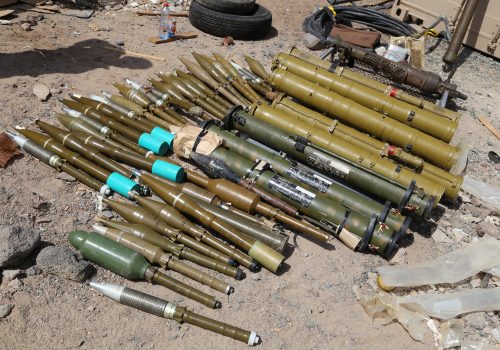Tim Michetti, an investigative researcher on illicit weapon transfers, recently wrote a new Atlantic Council report, “A Guide to Illicit Iranian Weapon Transfers: The Bahrain File.” During this discussion, Mr. Michetti presented his report, a comprehensive, field-based case study on illicit Iranian weapon transfers. Following his presentation, he was joined in discussion by Rachel Stohl, vice president of the Stimson Center; David Mortlock, a nonresident senior fellow with the Atlantic Council’s Global Energy Center and a partner at the law firm Willkie Farr & Gallagher; Jay Bahadur, investigator, author, and former coordinator of the UN Panel of Experts on Somalia; and moderator Norman Roule, former National Intelligence Manager for Iran in the Office of the Director of National Intelligence.
Using findings from the report, the panelists discussed ways to improve mitigation measures to prevent illicit weapon transfers and strengthen the efficacy of arms embargoes. The discussion also explored how current international arms control architecture, sanctions enforcement mechanisms, and lessons from WMD non-proliferation may be applied to mapping and dismantling underlying networks that facilitate the international trade in illicit weapons.
This event was be hosted via Zoom webinar by the Atlantic Council’s Scowcroft Middle East Security Initiative on Thursday, February 4, 2021 from 12:00 to 1:00 pm ET.
Speakers
Tim Michetti
Investigative Researcher on Illicit Weapon Transfers
Rachel Stohl
Vice President
Stimson Center
Jay Bahadur
Investigator, Author, and former Coordinator of the UN Panel of Experts on Somalia
David Mortlock
Nonresident Senior Fellow, Global Energy Center
Atlantic Council
Partner
Willkie Farr & Gallagher
Moderator
Norman Roule
Former National Intelligence Manager for Iran
Office of the Director of National Intelligence
Read the report & watch the video

Through our Rafik Hariri Center for the Middle East and Scowcroft Middle East Security Initiative, the Atlantic Council works with allies and partners in Europe and the wider Middle East to protect US interests, build peace and security, and unlock the human potential of the region.
